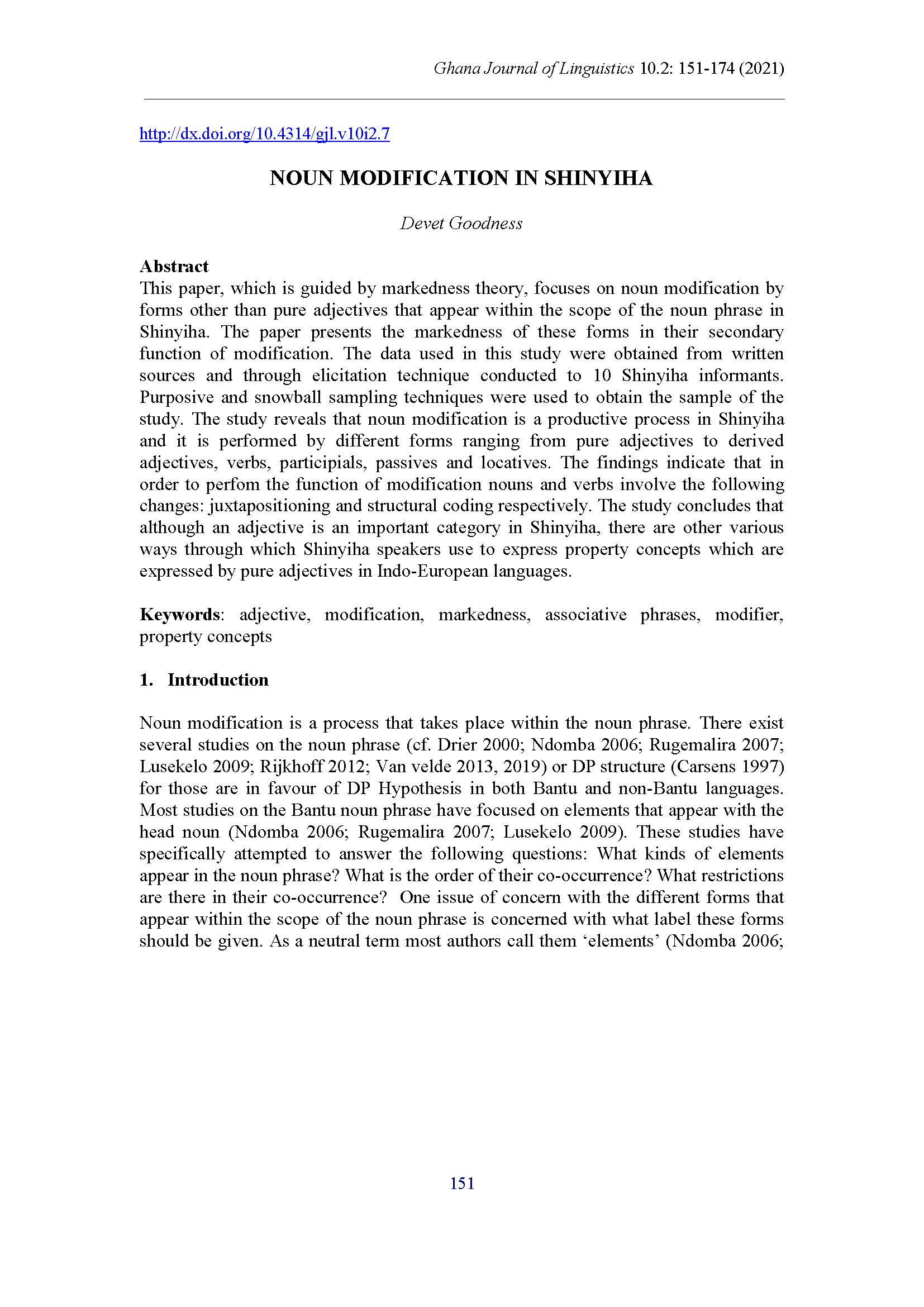Noun modification in Shinyiha
DOI:
https://doi.org/10.4314/gjl.v10i2.459Keywords:
noun modification adjective markedness derived nounAbstract
Modification is a typical defining function of adjectives in the world languages. However, it can be perfomed by single words, phrases or clauses. When dealing with modification of the noun, most studies (Rugemalira 2007, Lusekelo 2009, Van de Velde 2013; Williams 2005 etc) have focused on adjectives or on closed system elements (demonstratives, possessives, distributives, interrogatives etc) that appear within the noun phrase. Little attention has been paid to other marked forms like nouns, verbs, conjoined nous etc. that modify the head noun. This paper focuses on modification of nouns by nouns, verbs, participials, passives and locatives to express different property concepts. The paper uses markedness theory to show the markedness of forms other than pure adjectives to express property concepts. In addition the study shows structural changes taking place within these other modifiers. The study reveals that Shinyiha has several strategies its speakers use to modify the head noun including the use of derived nouns and irregular verbal forms which partake both properties of adjectives and verbs.
References
Bhat, D.N.S 1994. The Adjective category. Amsterdam Benjamens.
Carnie, A. 2013. Syntax: A Generative Introduction,Wiley-Blackwell,Singapore
printing Ltd.
Carstens V. 1993. ‘’On Nominal Moprhology and DP structure’’. In S. Mchombo
(eds).Theoretical Aspects of Bantu Grammar 2 (1), pp. 151-180. Carlifonia: CSL
publications.
Croft, W. 1991. Syntactic Categories and Grammatical Relations: The Cognitive Organization of Information: Chicago: University of Chicago.
Croft, W. 2001. Radical Construction Grammar: Syntactic Theory in Typological
Perspective, Oxford, Oxford University Press.
Croft, W. 2003. Typology and Universals. 2nd edition. Cambridge. Cambridge
University press.
Dixon, R. M. W. 1977. ‘’Where have all the Adjectives Gone?’’ Studies in Language
- 80, Revised Version Published as pp1-63 of Dixon, 1982.
______________1982. Where Have all the Adjectives Gone? Berline: Mouton.
__________ 2004. ‘’Adjective Classes in Typological Perspective’’, in Adjective
Classes, a Cross-Linguistic Typological Study, R.M.W Dixon
& Aikhenvald, A. (eds), 1-49. Oxford, OUP.
________1984. Syntax: A Functional-Typological Introduction. Vol.1. Amsterdam
and Philadelphia:John Benjamens Publishing Company.
Dryer, M.S 2000. ‘’Noun Phrase Structure’’. In T. Shopen (eds) Complex
Constructions, Language Typology and Syntactic Description, Cambridge, Cambridge
University Press (14)pp. 151-205.
Givon T. 2001. Syntax: An Introduction, Amsterdam, John Benjamins.
Williams D. 2005. Shinyiha Adjective as a Distinct Lexical Category, Unpublished
PhD Thesis, University of Dar es salaam.
Greenberg, J. 1966. Language Universals. The Hague, Mouton.
Halliday, M.A.K 1994. An Introduction to Functional Grammar, 2nd edn. London
Arnold.
Hopper, P. & Thompson, Sandra A. 1984. The Discourse Basis for Lexical
Categories, Universal grammar. Language (60), pp.703-752.
Langacker, R. 1987. Foundations of Cognitive Grammar, Theoretical
Prerequisites, Stanford, Stanford University Press.
__________ 2008. Cognitive Grammar, a Basic Introduction, Oxford, Oxford
University Press.
__________2009. Investigations in Cognitive Grammar, Mouton de Gruyter,
Berlin. New York.
Levinson, S. C. 2000. Presumptive Meaning: The Theory of Generalized Conversational Implicature. Cambridge:MA: MIT Press.
Lusekelo, A. 2009. ‘’The Structure of the Nyakyusa Noun Phrase’’, The Nordic
Journal of African Studies 18 (4):305-331.
Mpofu, N. 2009. Shona Adjective as a Prototypical Adjective, Unpublished PhD
Thesis, University of Oslo.
Ndomba, R. 2006. Samatengo Noun Phrase Structure. Unpubished MA Dissertation,
University of Dar es Salaam.
Nyanda, D. 2010. The Adjective as a Word Category in Kisukuma, Unpublished
MA (Linguistics) Dissertation.
Payne, E. 2010. Noun Complements vs Postnominal Modifiers, Understanding English
Grammar.
Radford, A. 2004. Minimalism Syntax, Oxford. Oxford University Press.
Rijkhoff, J. 2012. The Noun Phrase. London, Oxford University press.
Rugemalira, J.M 2007. The Structure of the Bantu Poun Phrase. SOAS Working Papers in Linguistics, vol.15, pp. 135-148
Rugemalira, J. M. 2008. Adjectives in Bantu, in Occasional Papers in Linguistics, LOT Publications, University of Dar es Salaam.
Rubin, E. J. 1994. Modification: A syntactic Analysis and its Consequences, PhDDdissertation Cornewell University.
Salaṻn, N. 1969. Cinyanja/Cicewa: Intensive Course, Lilongwe, Likumi Press Publishing House.
Stowell, Timothy Angus 1981. Origins of Phrase Structure PhD Dissertation,
Massachusetts Institute of technology.
Taylor J. R. 1991. Linguistic Categorization, Prototypes in Linguistic Theory,
Clarendon Press, London, Oxford University Press.
Van de Velde, M. 2001. The Bantu Connective Construction. In Carlier, A & J-C
Verstraete. The Genitive, 217-252; AMSTERDAM. John Benjamins.
Van de Velde 2013. Noun Morphology and Syntax, HAL The Bantu Languages, 2nd
Edition Routledge vol. 2 pp 237-269.

Downloads
Published
How to Cite
Issue
Section
License
Copyright (c) 2021 Devet Goodness

This work is licensed under a Creative Commons Attribution 4.0 International License.
The Ghana Journal of Linguistics is published by the Linguistics Association of Ghana, P. O. Box LG 61, Legon, Accra, Ghana.
LAG Email: linguisticsgh@gmail.com. Website: http://www.laghana.org
GJL Email: gjl@laghana.org Website: http://www.laghana.org/gjl
© Linguistics Association of Ghana and individual authors, 2023.
